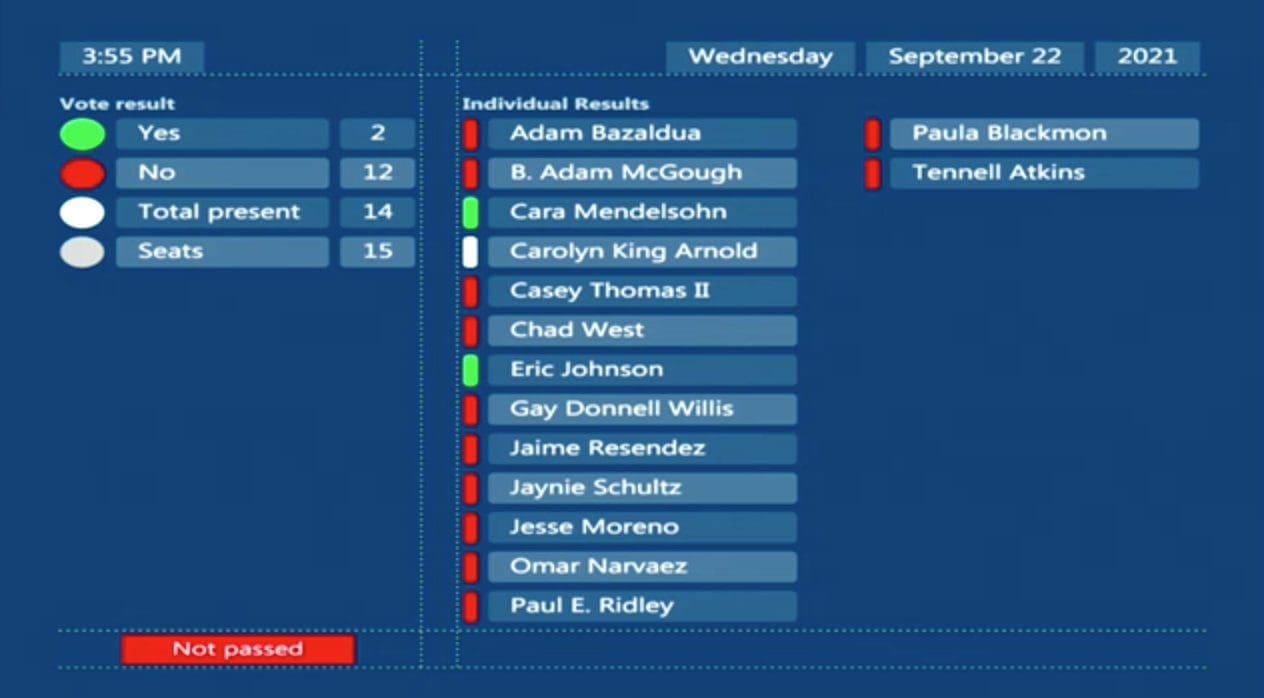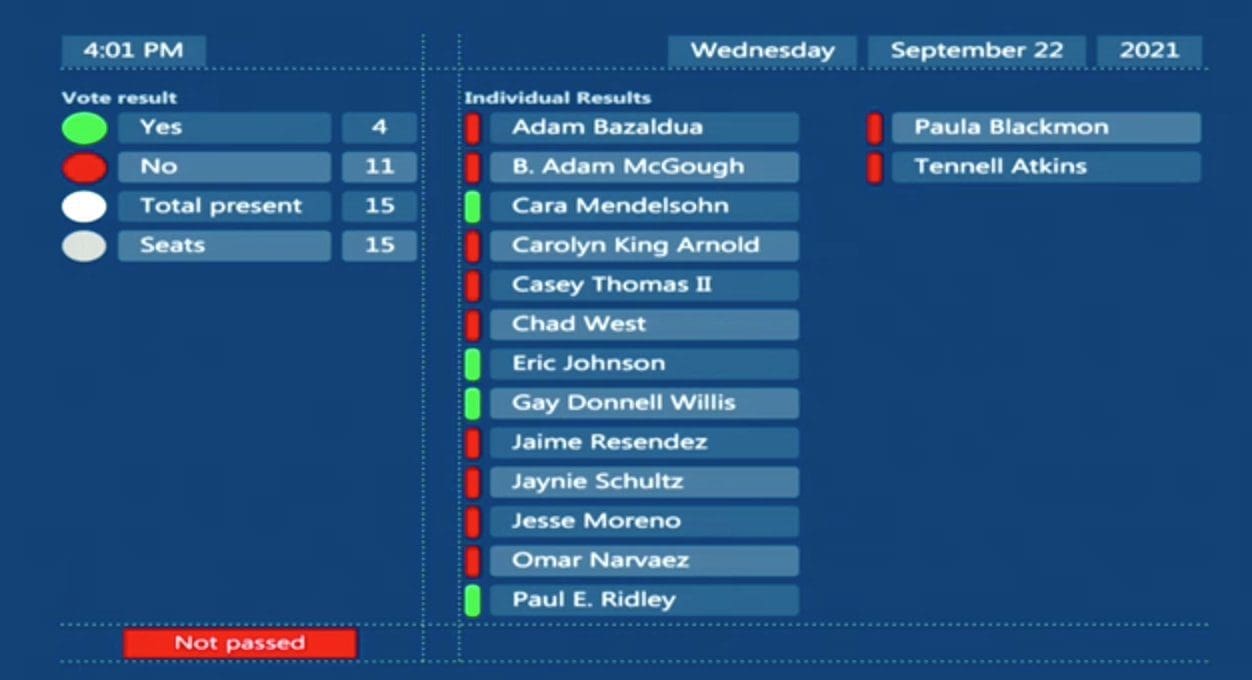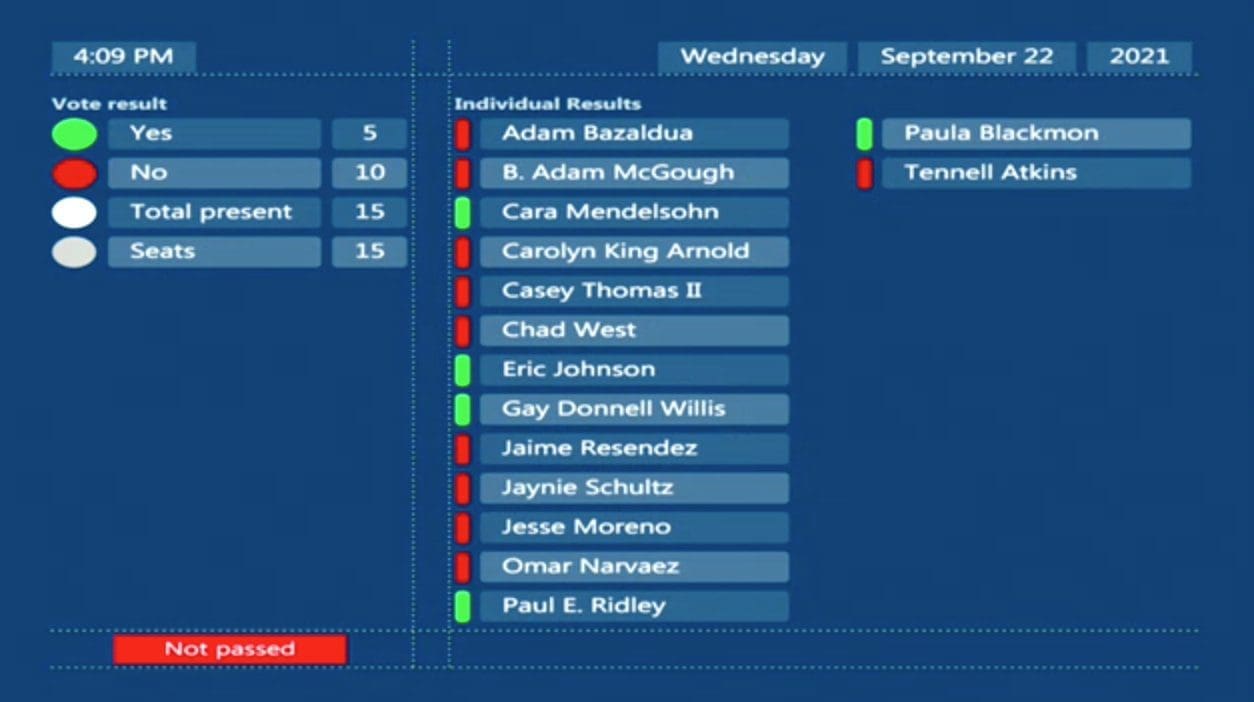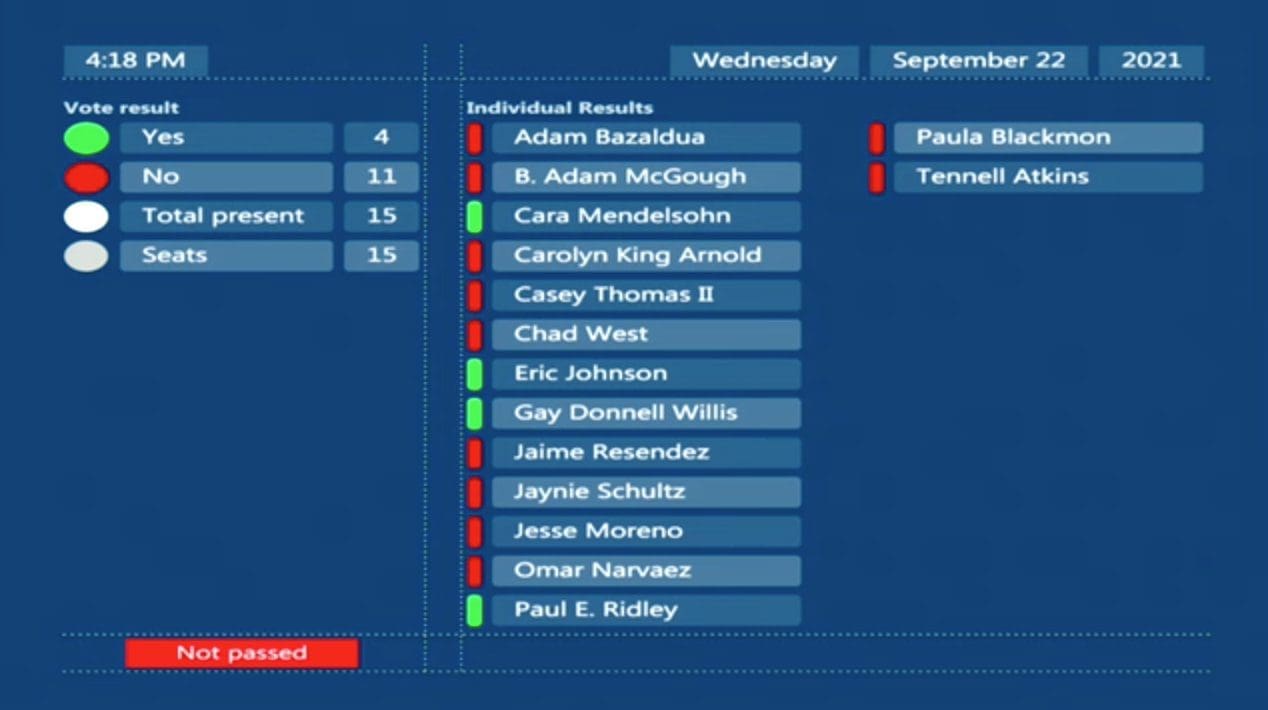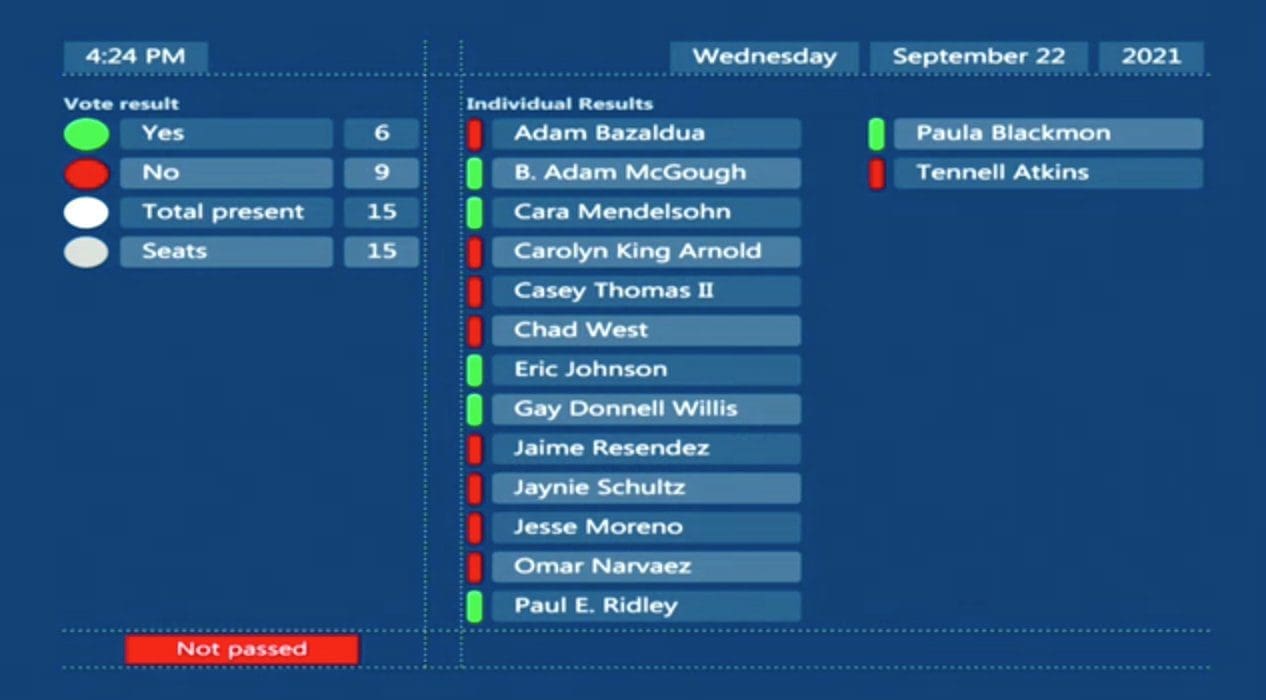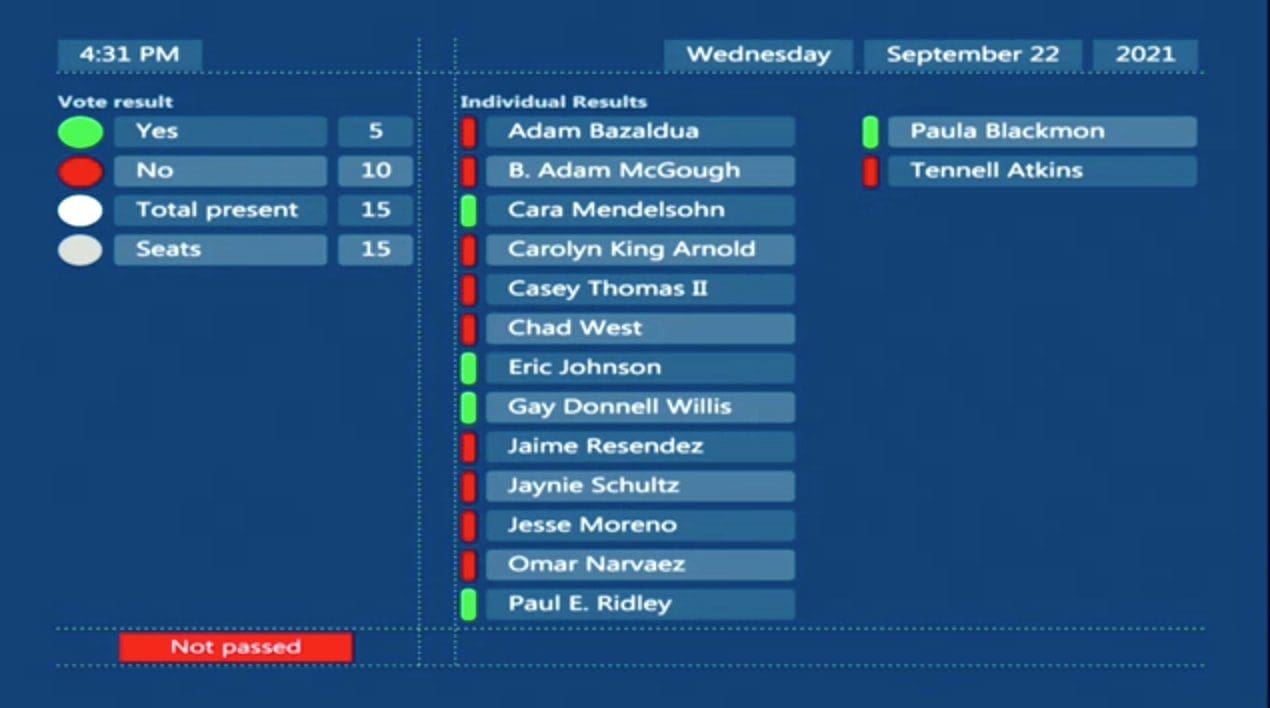Fort Worth, Dallas, and the Tarrant Regional Water District approved hiking spending and property taxes. Public safety was a topic in both major cities, and Dallas Mayor Eric Johnson succeeded in restoring funds to the proposed police overtime budget, reversing an earlier action of the city council.
Dallas
On Wednesday, the city council voted 13–2 to increase spending by 8 percent from last year to $4.3 billion. By the same margin, they voted to hike the city’s tax bill for the average homeowner by 4.56 percent from last year—$1,813 to $1,896—according Dallas Central Appraisal District data. This is more than 72 percent higher than it was in 2013.
Councilmember Cara Mendelsohn had proposed seven amendments that would have reduced these increased tax bills for the average homeowner through efficiencies in city departments. It would have reduced the average homeowner’s tax increase to 4.1 percent from last year, and 71.7 percent from 2013.
“These amendments are getting out of control,” Councilmember Omar Narvaez complained. “We’re talking about hurting our city employees in order to get a .006 tax reduction for the taxpayer,” he said during debate on one of the amendments.
A council majority rejected all seven amendments; only Mendelsohn and Mayor Eric Johnson consistently voted yes on all seven.
Mendelsohn voted against the budget and property tax rate because of the tax increases, adding, “I can’t support passing this kind of increase on our people.” Councilmember Gay Donnell Willis voted against both as well.
Mayor Eric Johnson succeeded in reversing Mayor Pro Tem Chad West’s September 10 amendment to hold $10 million of the proposed police overtime budget in a savings account, to be released only after a briefing of the Public Safety Committee. Every African American council member had voted against West’s amendment.
Johnson’s reversal was put forward by Councilmember Tennell Atkins. It passed by a vote of 12-3 with only West, Jaime Resendez, and Paul Ridley voting against it.
Fiscal responsibility had been one of West’s main points in his argument for withholding the $10 million. During Wednesday’s meeting, he and other council members raised concerns about the findings of an interim report of the police overtime audit. In response to questions from Ridley, City Auditor Mark Swann confirmed 56 percent of the overtime transactions studied “were either not documented with overtime cards,” were not authorized, or did not have “evidence” for use.
Swann pointed out, “We had close to 88 percent of supervisor approval. … There is written justification on the request.”
“The audit team collectively determined they could not determine there was waste or abuse in the missing documentation,” Swann said. “They believed it was more a poor filing system.”
West focused on the $9.4 million of undocumented overtime spent. “There’s 12 percent we don’t have any documentation from the supervisor on,” he said. “If this were any other department in the city, we would be tearing them up.”
Mentioning how a council majority seemed concerned with overtime, one of Mendelsohn’s amendments to lower tax increases would have reduced funding for non-uniform civilian overtime. West was among those who opposed it. “It seems some folks are fine cutting 50 percent of overtime from other departments,” he said. “I absolutely cannot support this amendment.”
Fort Worth
Tuesday evening, the Fort Worth City Council unanimously voted to increase spending more than 4 percent to more than $2 billion. They also unanimously approved a property tax rate that Tarrant Appraisal District data shows will hike city tax bills for the average homeowner by more than 5 percent from last year—$1,223 to $1,292. This is more than 54 percent from 2013.
Speaking on the tax rate, Councilmember Cary Moon said, “We represent about 17 percent of [your overall] tax bill,” and, “Our goal is [that] as your property tax increases, we lower our tax rate to offset that.”
Michael Glenn, president of the Fort Worth Firefighters Union, raised concerns about the firefighters being short-staffed by 254 positions; alleged City Manager David Cooke “fiddled away” money; and asked for an independent audit of firefighters’ needs. Councilmember Carlos Flores moved to increase firefighting staffing, and Moon said 38 additional positions were added in the budget and firefighter needs would be addressed through a staffing study.
Moon addressed concerns from citizen Thomas Torlincasi about money in the budget going to the TRWD—which is shrouded in controversy from the billion-dollar Panther Island boondoggle. “I want to specify with this specific budget there is no money going to … the TRVA project,” Moon said, adding they only buy raw water from the district.
“Be mindful of the people that have handed money to you in order to do what I consider a sacred trust and spend it appropriately,” Torlincasi told council members that night. He also asked them to “ask more questions than you have in the past” when it comes to TRWD.
TRWD
Earlier on Tuesday, the board of the Tarrant Regional Water District voted to increase spending from $152.3 million in the last budget to $185.8 million, and to hike their property tax bill for the average homeowner more than 7.5 percent from last year—from $54 to $58. This is 143 percent higher from 2013.
Board member Mary Kelleher brought up concerns about the taxpayer. “Is it possible … maybe we can look at refunding the taxpayer some of this money?” she asked. “There is no way to send money back after it’s been collected,” TRWD CFO Sandy Newby replied. She did say the board can consider lowering the tax rate to take in less.
No one proposed adopting the no-new-revenue rate, which would keep tax bills more or less stable, though individual results may vary.
At TRWD’s property tax hearing Monday, citizen Robert Cross told board members how higher tax burdens are a threat to his grandchildren. “They’re just getting started in life, and the government just keeps spending more and more,” he said. “I know you’re a small part, but small parts add up to a large part.”

